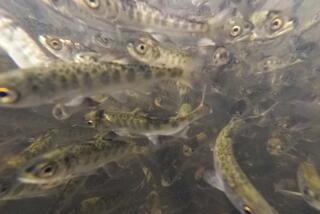The Spill
- Share via
An estimated 84,000 gallons of oil spilled into McGrath Lake, a drainage pond for storm water and area farms, and the nearby ocean on Saturday. The spill will be costly to clean up and could have a devastating effect on local waterfowl.
Tracking the Origin
1. Pipeline break occurs prior to Christmas morning.
2. Crude oil flows down drainage canal and into McGrath Lake.
3. McGrath Lake fills, triggering an automatic pump that regulates lake level.
4. Oil is pumped from the lake into a pipeline, then into a slough that empties into the ocean.
5. Pipeline leak is discovered 7:25 a.m. Christmas Day from a helicopter.
6. Cleanup crews are called in to contain and remove spill, and wildlife rescue workers are called to save oil-coated animals.
Cleaning It Up
* A crew of more than 100 uses shovels to scoop oil-drenched sand into plastic bins.
* Bulldozers push oil-stained sand off the beaches.
* Skiffs pull booms across McGrath Lake to gather the oil.
* 13 boats work half a mile offshore to contain the widening oil slick.
* Even after cleanup, the oil kills insects, disrupting the food chain.
* Oil can also seep into the soil and then resurface later to create a new oil slick.
Aiding the Victims
More than 40 birds have already been found dead following the spill. However, the full impact on the area’s wildlife is yet to be determined.
McGrath Lake, the area most environmentally threatened by the spill, is home to at least two endangered species, the California brown pelican and the snowy plover.
As many as 30 species of ducks use the lake as an overwintering spot, according to the Audubon Society. They share it with herons, egrets, sandpipers and other birds.
Effect on birds:
* Birds lose their natural insulation if they get oil on their feathers.
How they are treated:
* Cotton swabs are used to cleanse birds’ eyes and beak of oil.
* Birds are rinsed with mineral oil or saline solution.
* Birds are fed tubes of charcoal-based commercial liquid designed to counteract the toxic effects of any oil that they may have ingested.
Sources: Berry Oil Co. and the California Department of Fish and Game.
More to Read
Sign up for Essential California
The most important California stories and recommendations in your inbox every morning.
You may occasionally receive promotional content from the Los Angeles Times.













